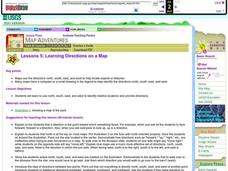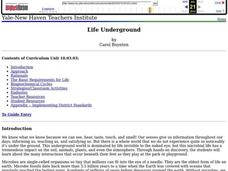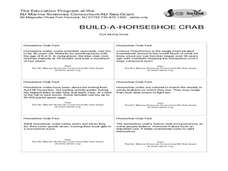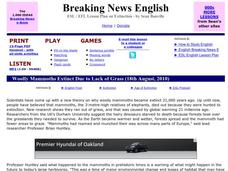Curated OER
Sneaky Snake
Students examine the letter 's'. Through instruction and modeling they explore the sound the letter makes, how the letter is written, words that contain the letter, etc. They listen to a story and identify words with the /s/ sound by...
Curated OER
Paleontology: A Field Experience
Young scholars go to a dig where they prospect for bones which simulate fossils. They encase the bones in plaster and transport them back to school for further investigation.
Curated OER
Learning Directions on a Map
Students use north, south, east, and west to identify relative locations and provide directions.
Curated OER
Roger the Rock
Here is a creative way to assess your geologists' grasp of the rock cycle: have them write and illustrate a children's book in which the main character journeys though his life, i.e. the rock cycle! A brief student instruction sheet and...
Curated OER
What Do We Learn From Fossils?
Students investigate what a fossil is and how it came to be. In this fossil lesson, students examine pictures of skeletons and identify characteristics that can and cannot be determined by a fossil. Students complete diagrams...
Curated OER
Poke and Look Learning Books
Students read Poke and Look Learning Books and complete predicting activities, reading, questioning, and more. In this Poke and Look Learning Books, students do this for 13 different books.
Curated OER
Life Underground
First graders build a terrarium in order to observe animal and plant life dynamics. In this biology lesson, 1st graders compare how organisms survive in different environments. They write their observations and analysis in their journal.
Curated OER
Text Structure 2
In this reading worksheet, students read different passages of text and fill out graphic organizers for each one. Students read 6 texts total.
Curated OER
Adjectives
First graders participate in group activity in which they examine how to use words, adjectives, to better describe people, animals, places, and things. They listen to a read aloud of "The Napping House" while describing items on each...
Curated OER
Nouns
In this nouns review worksheet, students practice their grammar skills as they identify all of the nouns in 42 sentences.
Curated OER
Build-A-Horseshoe Crab
Pupils discover many facts about horseshoe crabs. Students identify the main body parts of horseshoe crab. They explore the habits of the horseshoe crab and their importances to the ecosystem. Adaptations for younger pupils are included.
Curated OER
God's Creation
Second graders explore religion by analyzing the state of the country. In this American creation lesson, 2nd graders read that God created the world and therefore the United States and all of the beautiful things within the country....
Curated OER
Breaking News English: Woolly Mammoths Extinct Due to Lack of Grass
In this English learning exercise, students read "Woolly Mammoths Extinct Due to Lack of Grass," and then respond to 1 essay, 47 fill in the blank, 7 short answer, 20 matching, and 8 true or false questions about the...
Curated OER
Science: The Age of the Redwoods
Learners discover how to estimate the age of redwood trees. They measure the trees' diameters by using string to calculate the circumferences. Students conclude by discussing the science of dendrochronolgy.
Curated OER
Skin of Our Teeth by Thornton Wilder
For this allusion worksheet, students work in pairs to define the allusions assigned to them from the play 'Skin of Our Teeth.' Students present their research to the class.
Curated OER
Breaking News English: The Chicken Came Before the Egg
In this English activity, students read "The Chicken Came Before the Egg," and then respond to 1 essay, 47 fill in the blank, 7 short answer, 20 matching, and 10 true or false questions about the selection.
Australian Broadcasting Corporation
Australian Broadcasting Corporation: Walking With Dinosaurs
Dig into this collection of dinosaur resources offered for dinosaur walkers of all ages. Hit the Dinosaur Playground with younger students to engage in a variety of games, activities, and puzzles.
BBC
Bbc Earth: Walking With Dinosaurs: Memory
A memory game with dinosaur facts! Every time a student gets a match on their memory game, they receive information about the dinosaur or animal found on that card.
Australian Broadcasting Corporation
Australian Broadcasting Corporation: Walking With Dinosaurs: Fact File: Plateosaurus
Plateosaurus was one of the first "giant dinosaur herbivores" and evolved during the Late Triassic period. Learn what fossils teach us about this dinosaur's size, diet, migration habits, and anatomy.
Australian Broadcasting Corporation
Australian Broadcasting Corporation: Walking With Dinosaurs: Fact File: Ophthalmosaurus
Read information about the dolphin-shaped opthalmosaurus, and learn what fossil evidence tells us about this marine dinosaur's hunting, anatomy, and young. View a listing of quick facts about the opthalmosaurus' size and diet, and launch...
Australian Broadcasting Corporation
Australian Broadcasting Corporation: Walking With Dinosaurs: Fact File: Coelophysis
The Coelophysis lived in the Late Triassic period over 215 million years ago. A large cache of Coelophysis bones were found in New Mexico in 1947 - the dinosaurs had apparently died of thirst. This fact file has more information and a...
Australian Broadcasting Corporation
Australian Broadcasting Corporation: Walking With Dinosaurs: Fact File: Diplodocus
Diplodocus, a sauropod, "was the longest of the land animals" and its fossilized remains tell us much about its body type, weight, and diet. Read facts about this dinosaur and view several images showing what it looked like while alive.
Australian Broadcasting Corporation
Australian Broadcasting Corporation: Walking With Dinosaurs: Fact File: Anurognathus
Anurognathus, from the Late Jurassic period, was a "tiny pterosaur and a cousin of the dinosaurs." Learn what the one fossil of this prehistoric animal, found in Bavaria, tells us about its diet, anatomy, and size. This resource includes...
Australian Broadcasting Corporation
Australian Broadcasting Corporation: Walking With Dinosaurs: Fact File: Quetzalcoatlus
A brief description of the quetzacoatlus, "the largest flying creature of all time," which lived during the Late Cretaceous period over 65 million years ago. Find fast facts about this animal's size and fossil location, as well as...

























